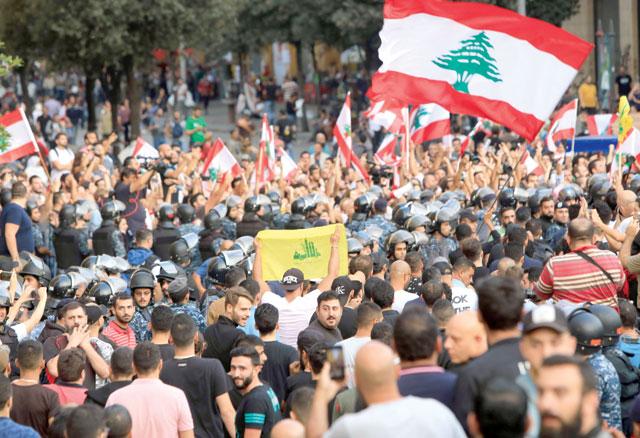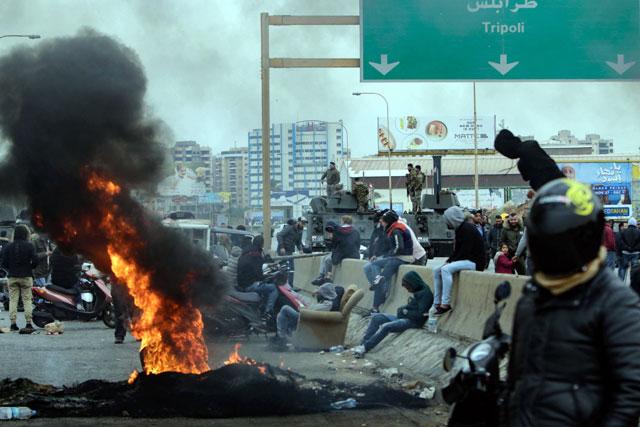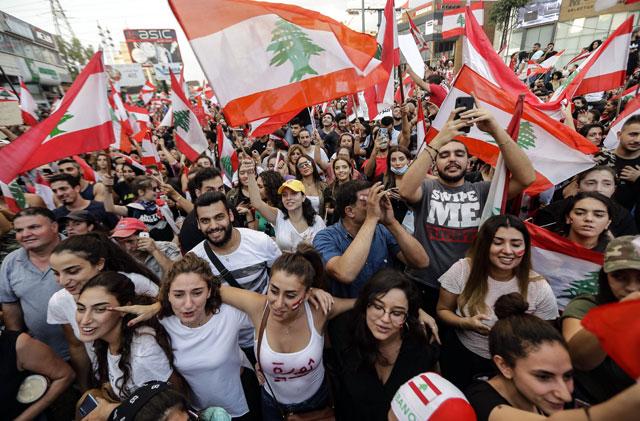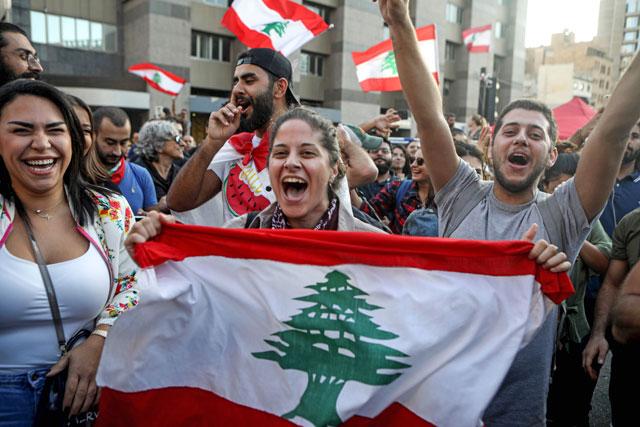You are here
Lebanese take to streets for 10th day, demanding removal of political class
By AFP - Oct 26,2019 - Last updated at Oct 26,2019

Lebanese security forces stand between supporters of Shiite Hizbollah movement (foreground) and anti-government protesters (background) at Riad Al Solh Square in the capital Beirut on Friday on the ninth day of protest against tax increases and official corruption (AFP photo)
BEIRUT — Demonstrators in Lebanon blocked roads and trickled into streets across the country for a tenth consecutive day Saturday.
The demonstrators — who have thronged towns and cities across Lebanon since October 17 — are demanding the removal of the entire political class, accusing many across different parties of systematic corruption.
Numbers have declined since October 20, when hundreds of thousands took over Beirut and other cities in the largest demonstrations in years, but could grow again over the weekend.
The chief of Lebanon's Hizbollah on Friday called on his supporters to leave the streets, warning that any Cabinet resignation would lead to "chaos and collapse" of the economy.
He also said that the protesters were being manipulated by "foreign powers" who wanted to leverage the unrest, shortly after his supporters clashed with demonstrators in Beirut.
His statement sowed divisions among Hizbollah supporters, some of whom were still protesting on Saturday morning.
Hassan Koteiche, 27, from a Hizbollah stronghold in Beirut, said he agreed with most of Nasrallah's "excellent" speech, but had some reservations.
"This does not mean we are against his discourse but there is a divergence in opinion," he told AFP.
“The main thing I disagree with is his belief that if the government or parliament falls then we would have no alternative,” he added.
“That is not true. We have alternatives. We have noble and uncorrupt people,” who can govern.
‘We will stay’
Main roads remained closed across the country on Saturday morning, as the army tried to reopen key routes.
Northeast of Beirut, dozens of demonstrators formed a human chain to prevent the army from removing a dirt berm blocking a sea-side road.
In central Beirut, they sat cross-legged on a key artery that connects the capital to its suburbs and surrounding regions but the army later cleared them and opened the road.
Nearby, droves of volunteers swept streets and collected rubbish after protests went late into the night, with people dancing on the street and in and abandoned former movie theatre.
Demonstrators who had slept in tents near Martyrs Square, said they were still defiant on the tenth day of their protest movement, despite attempts by Hizbollah to rattle protesters.
“We will stay on the streets,” said Rabih al-Zein, a 34-year-old from the Shiite-stronghold of Tyre, which saw unprecedented demonstrations over the past week.
“The power of the people is stronger than the power of the parties,” he told AFP in central Beirut, adding that Hizbollah supporters would not keep them from demonstrating.
Lebanon’s largely sectarian political parties have been wrong-footed by the cross-communal nature of the largely peaceful protests.
Waving Lebanese flags rather than the partisan colours normally paraded at demonstrations, protesters have been demanding the resignation of all of Lebanon’s political leaders.
“All of them means all,” has been a popular slogan.
Counter-demonstrations
In recent days, loyalists of Hizbollah and the Free Patriotic Movement (FPM) — a Christian party founded by President Michel Aoun — mobilised counterdemonstrations across the country, sparking scuffles with demonstrators and journalists.
The Iran-backed Hizbollah, considered a terrorist organisation by Israel and the United States, is the only movement not to have disarmed after Lebanon’s 15-year civil.
Hundreds of its supporters gathered in the group’s strongholds in Beirut’s southern suburbs and the southern cities of Nabatiyeh and Tyre on Friday after Nasrallah’s speech, brandishing party flags.
In central Beirut, they clashed with protesters, prompting riot police to intervene to break up the fight.
In Nabatiyeh on Saturday, dozens of anti-government demonstrators returned to the streets, with a protester saying he was counting on the army and security forces to protect them from party loyalists.
In a suburb north of Beirut, dozens of FPM loyalists staged a counter demonstration to express their support for the embattled president.
Lebanon endured a devastating civil war that ended in 1990 and many of its current political leaders are former commanders of wartime militias, most of them recruited on sectarian lines.
Persistent deadlock between them has stymied efforts to tackle the deteriorating economy, while the eight-year war in neighbouring Syria has compounded the crisis.
More than a quarter of Lebanon’s population lives in poverty, the World Bank says.
Related Articles
BEIRUT — Lebanon's army said on Wednesday it detained 16 people during a third night of violence across the country, as tensions increased f
BEIRUT — Tens of thousands of Lebanese people took to the streets Saturday for a third day of protests against tax increases and alleged off
BEIRUT — Lebanon's prime minister on Tuesday announced he was submitting the resignation of his government, bowing to nearly two weeks of un


















